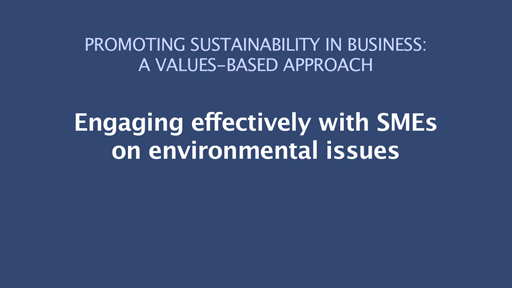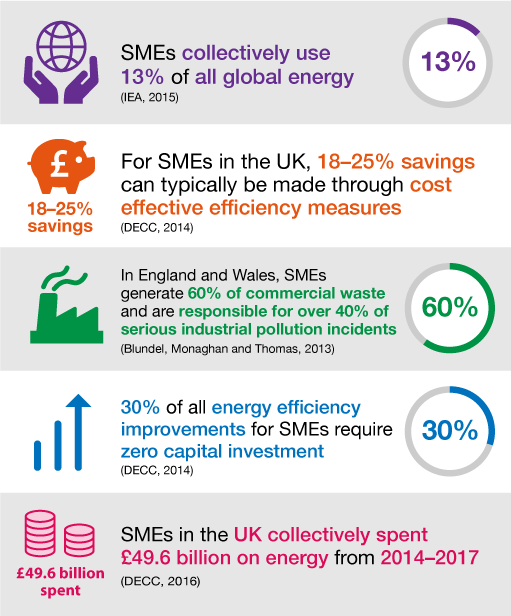Use 'Print preview' to check the number of pages and printer settings.
Print functionality varies between browsers.
Printable page generated Wednesday, 4 February 2026, 2:36 AM
1 The business challenge
1 The business challenge
Engaging with small and medium-sized enterprises (SMEs) can be challenging, but it’s essential if we are to meet climate change targets and address other important environmental problems.
There are nearly six million SMEs in the UK, representing 99.9% of all businesses and collectively they have a large impact on the environment. The term ‘SME’ includes a wide variety of business types, ranging from fairly large manufacturing companies to small family firms, social enterprises and micro-businesses. There is considerable potential for improving their environmental performance. For example, the average SME could save up to 25% of its energy usage through relatively simple, low-cost measures. Unfortunately, for many different reasons SMEs don’t typically take up these opportunities.
While it is generally accepted that policy support is needed, interventions of any kind that affect SMEs tend to be politically charged. Traditional ‘hard-lever’ policies, such as regulation, can have a disproportionate impact on smaller organisations compared with larger organisations. They can struggle with the bureaucracy and paperwork required, and it can also be expensive and time-consuming for government agencies to ensure that such a large number of businesses are complying. For these reasons, incentive-based policies are often preferred when it comes to environmental policy for SMEs. These include financial support such as grants and loans for making investments in energy efficient equipment, or expert advice from sustainability professionals.
The main sources of environmental impact from SMEs is related to the energy they use in the buildings they occupy, and business travel.
We begin by looking at an example of a business that has taken proactive steps towards reducing their environmental impact by collaborating with a local social enterprise.
1.1 Introductory case
Low Carbon Hub: a collaborative business model
 | Low Carbon Hub (LCH) is a social enterprise based in Oxfordshire. They develop and deploy community-owned renewable energy installations across the county, on school and business rooftops. Working with a producer of medical devices, Owen Mumford, they were able to install large solar panel arrays on four of their buildings in rural Oxfordshire. |
Because the finance for the panels is raised using a community-based investment model, the panels were installed at zero cost to the business. Owen Mumford benefit from a considerable saving on the cost of electricity, and anything they don’t use is then exported to the grid, to be used elsewhere. This contributes to the growing share of UK energy supplied from renewable sources. Since LCH is a social enterprise, all funds that are generated from exporting the energy can be reinvested into other similar projects.
This not only benefits Owen Mumford with lower electricity costs and reduced carbon emissions, but the nature of the Low Carbon Hub business model means that the collaboration with Owen Mumford will also be supporting the roll-out of community renewable energy to schools, church halls and community centres across Oxfordshire.
 Thinking point
Thinking point
Low Carbon Hub (LCH) is a real pioneer for community energy in the United Kingdom. Renewables initiatives like this are often run by publicly funded local authorities, but LCH have raised investment from the local community to install solar panels on the rooftops of small businesses throughout Oxfordshire. Although LCH currently benefits from government subsidies for the power that is generated, they anticipate that as the cost of projects falls, they will be able to continue to operate even if subsidies are removed.
The collaboration with Owen Mumford also illustrates something of an ‘ideal situation’, where businesses can benefit financially from low carbon investments without incurring any direct costs. Do you think that this model, which takes away the need for capital investment by the business, could encourage more SMEs to engage?
1.2 Effective engagement with SMEs
In the opening activity, low carbon advisor and researcher Sam Hampton opens the course with a brief introduction to the challenge of engaging more effectively with SMEs on environmental issues.
Activity 1.1: Engaging effectively with SMEs on environmental issues
Sam Hampton is a low carbon advisor with OxLEP Business, supporting local firms to reduce their environmental impact. He has also conducted research on energy policy, SMEs and the role of intermediaries at Oxford University’s Environmental Change Institute. In the following video, Sam sets out some of the more common arguments for addressing the environmental performance of smaller businesses. He also talks about the challenges that people face when they seek to engage business owners and managers in discussions about their environment-related practices. Lastly, he considers how a values-based approach might help to address some of these challenges. |

Transcript
Engaging effectively with SMEs on environmental issues
[MUSIC PLAYING]
[Why are SMEs so important in addressing climate change and other environmental issues?]
[Working with low carbon advisors]
[Personal and business values]
[Values-based engagement vs. conventional policy interventions]
[MUSIC PLAYING]
[The ‘Growing Greener’ project team has drawn on these insights, related research findings, and run a series of practitioner workshops to co-create a toolkit for values-based engagement]
Watch the video (around 4 minutes) and make your own notes on the following points:
- Sam gave a number of reasons why SMEs have an important role to play in addressing climate change and other environmental issues. Summarise his arguments in your own words, indicate how far you agree with him, and note any other issues that you see as important.
- Sam explained how his research on people working with SMEs, and his own experience as a low carbon advisor, reinforced the view that, ‘it’s the soft stuff that’s hard’. In other words, while technical discussions can be difficult at times, many practitioners find that the most difficult part of their role is dealing with the attitudes and values of business owners and managers. What is your initial reaction to this argument (e.g. how does it compare to your own experience)?
- Sam suggested that a ‘values-based’ engagement approach could reinforce conventional policy interventions, such as financial incentives and advisory services. Are you convinced by his arguments (e.g. do you think that this approach might work in your own work setting)?
We recommend that you keep these notes as a record of your initial thoughts that you can revisit during the course. Feel free to copy them into the note-taking file provided.
Comment
This video and the accompanying questions are designed to get you thinking about the concept of values-based engagement and how it might be used in your own situation. There are no ‘right’ or ‘wrong’ answers, but you may be interested to know that practitioners in our research, and at the workshops, expressed a range of views on these issues.
- Some advisors felt that it was too difficult to initiate relationships with SMEs on anything other than financial terms:
- ‘It’s pretty basic really – we go on the pound sign. That’s how we sell these programmes to businesses. We've come across it time and time again: when we rock up with a clipboard and say we're from the County Council, the shutters come down.’ (SC)
- ‘A lot of businesses seem to think that it’s some sort of scam or catch.’ (GD)
- However, advisors knew that the financial case for being more energy efficient wasn’t enough to convince SMEs to make changes.
- ‘I’ve seen 10 billion projects start and fail because all they do is go in and do an audit, write a report, leave a report, walk away. Nothing happens and I get absolutely infuriated because it is not just information failure, it’s a wider, more complex market failure.’
- Most advisors in our research were themselves strongly motivated by the desire to fight climate change. And it was a source of frustration that in their work they nearly always avoided that topic, and tried to achieve carbon emissions reductions through other means:
- ‘Every time I speak to businesses I tell them they can save money, that’s the main focus. I know the business is not going to be that interested in being green. Even though they should, it’s just one of those things.’ (GD)
- Other programmes would not compromise on their own values and wanted to build them into their engagements with SMEs:
- ‘We're looking to imbue the project with our ethics, in everything we do. But there is a sensitivity with respect to marketing, because you're approaching a market which is not necessarily aware or wants to know about reducing their carbon footprints.’
 Thinking point
Thinking point
Consider how the ideas in the first activity may relate to your own professional experience. If you’ve worked with SMEs before, do you think you have made assumptions about what motivates them? What motivates you to do the job you do?
1.3 Effective business support
The second activity in this session presents evidence on the work of low carbon advisors and how it might be made more effective.
Activity 1.2: Making business support more effective
Summary and action points
In this session we have reviewed the energy consumption and environmental impact derived from SMEs, and seen examples of the kinds of approaches taken by low carbon intermediaries in order to bring about positive change.
You should now be able to:
- Compare your own professional experiences of working in or with SMEs with other low carbon advisors such as Sam Hampton in the video.
- Explain why there is a need for government-funded intervention.
- Understand the most common approaches to providing low carbon business support, and explain why ‘it’s the soft stuff that’s hard’.
You have now completed Session 1.



